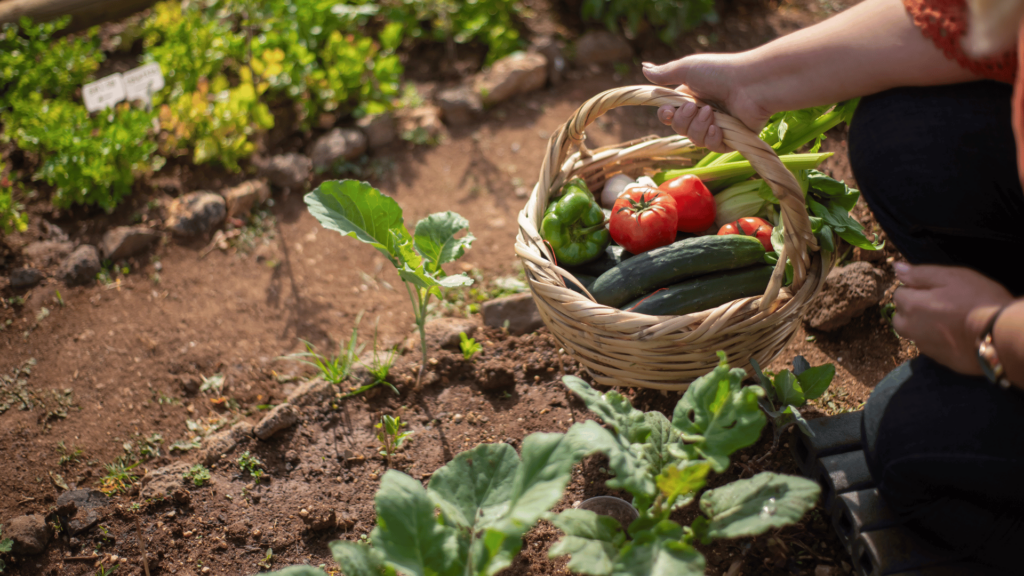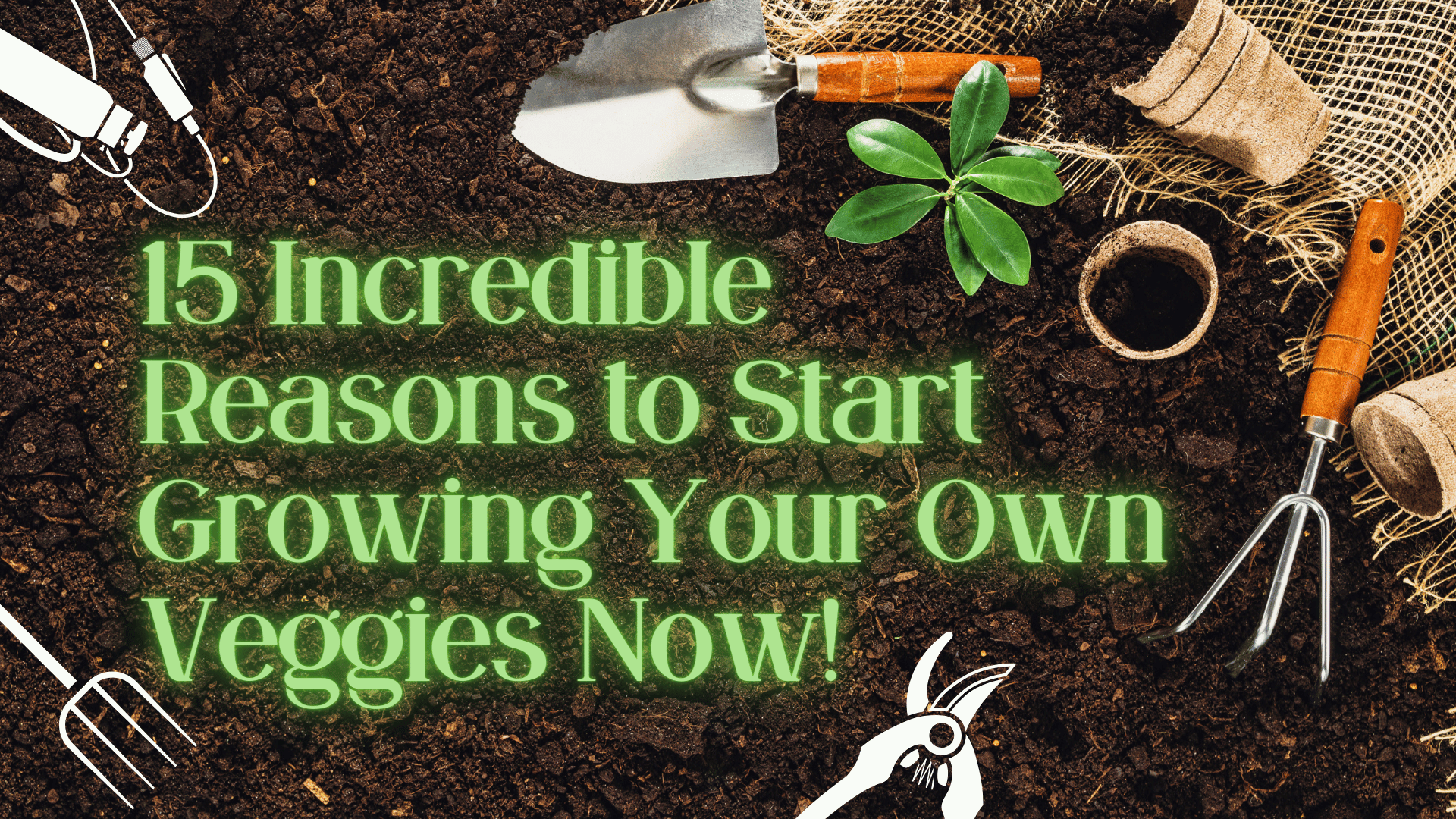There’s nothing quite like the joy of picking fresh vegetables from your own garden. Whether you have a big backyard or just a small balcony, growing your own veggies is a fantastic hobby that offers so many rewards. If you’re a home gardener or a DIY enthusiast, you’ll love the countless benefits that come with cultivating your own little green haven. Let’s dive into why growing your own vegetables is such a great idea and how you can get started.
Health and Nutrition: Freshness at Your Fingertips
1. Freshness and Quality
One of the best things about growing your own vegetables is the unbeatable freshness. Veggies from your garden go straight from the soil to your plate, meaning they’re bursting with flavor and nutrients.
Tasty Delights: Homegrown veggies, like tomatoes and carrots, taste so much better than the ones you get from the store. They’re sweet, juicy, and absolutely delicious because they’re allowed to ripen fully before you pick them.
2. No Harmful Chemicals
When you grow your own vegetables, you control everything that goes into your garden. That means you can choose to go organic and avoid harmful pesticides and fertilizers, making your veggies safer and healthier.
Organic Goodness: By using compost and natural fertilizers, you not only protect your health but also help the environment. It’s a win-win!
3. Increased Nutrient Intake
Freshly harvested vegetables are packed with essential vitamins and minerals. When you eat them right after picking, you get the maximum nutritional benefits.
Variety is Key: Growing a range of veggies ensures you’re getting a variety of nutrients. Plus, it’s fun to try out different types of vegetables, from heirloom tomatoes to exotic peppers.
Cost Savings: Grow Your Own, Save Your Money
4. Reduced Grocery Bills
Growing your own vegetables can significantly cut down your grocery expenses. Once you’ve set up your garden, the ongoing costs are minimal compared to what you’d spend at the store.
Smart Savings: Think about how much you spend on organic produce. By growing your own, you can save a lot of money, especially during the harvest season when your garden is overflowing with fresh veggies.
5. High Yield from Small Spaces
Even if you don’t have a lot of space, you can still grow plenty of vegetables. Container gardening, vertical gardening, and other space-saving techniques make it possible to have a productive garden even in small areas.
Creative Gardening: Try using raised beds, pots, or even hanging baskets to maximize your space. You’ll be surprised at how much you can grow in a small garden!
Environmental Benefits: Green and Clean
6. Reduced Carbon Footprint
When you grow your own vegetables, you reduce the need for long-distance transportation and packaging, which lowers your carbon footprint.
Sustainable Living: Home gardening supports local ecosystems and reduces reliance on industrial agriculture. You’re contributing to a healthier planet by growing your own food.
7. Promotes Biodiversity
Your garden can become a mini-ecosystem, supporting a variety of plants, insects, and birds. Planting different types of vegetables, flowers, and herbs encourages biodiversity and creates a thriving garden.
Wildlife Haven: Attract beneficial insects like bees and butterflies by planting native flowers and creating a welcoming habitat in your garden.
8. Composting Benefits
Gardening encourages composting, which turns kitchen scraps and garden waste into valuable compost. This enriches your soil and reduces landfill waste.
Eco-Friendly Gardening: Composting is a simple way to recycle organic waste and create nutrient-rich soil for your garden. It’s good for your plants and the planet!
Physical and Mental Well-being: Garden Therapy
9. Physical Exercise
Gardening is a great way to stay active. Digging, planting, weeding, and watering provide a full-body workout that’s gentle on your joints and muscles.
Healthy Hobby: Regular gardening can improve your strength, stamina, and overall physical health. It’s a fun way to get some exercise and enjoy the outdoors.
10. Mental Health Benefits
Spending time in the garden can reduce stress, anxiety, and depression. The act of nurturing plants and being in nature has a calming effect and promotes a sense of well-being.
Mindful Gardening: Gardening allows you to slow down and focus on the present moment. It’s a great way to relax, clear your mind, and connect with nature.
11. Connection to Nature
Gardening helps you reconnect with nature and appreciate the beauty of the natural world. This connection can boost your happiness and provide a sense of purpose.
Nature’s Therapy: Spending time in your garden can improve your mood and overall mental health. It’s a peaceful escape from the hustle and bustle of everyday life.
Educational Opportunities: Growing and Learning
12. Learning and Skill Development
Gardening is a continuous learning journey. You’ll gain knowledge about plant biology, soil health, and eco-friendly practices. It’s a rewarding skill that you can pass down to future generations.
Lifelong Learning: From experimenting with new plant varieties to mastering organic pest control, there’s always something new to learn in the garden.
13. Family Bonding
Gardening is a wonderful activity for the whole family. It’s a great way to teach children about where their food comes from and the importance of taking care of the environment.
Fun for All Ages: Kids love getting their hands dirty and watching plants grow. Gardening together can create lasting memories and foster a love for nature.
Taste and Variety: Culinary Adventures
14. Superior Taste
Homegrown vegetables often taste better than store-bought ones. They’re fresher, more flavorful, and you can pick them at their peak.
Flavor Explosion: There’s nothing quite like the taste of a sun-ripened tomato or a freshly picked cucumber. Your homegrown veggies will be the stars of your meals.
15. Variety of Choices
When you grow your own vegetables, you can experiment with different varieties that you won’t find in stores. Try growing heirloom tomatoes, colorful peppers, or unique herbs to add diversity to your garden and your diet.
Garden Delights: Exploring new and unusual vegetable varieties can be exciting and rewarding. You’ll enjoy a wider range of flavors and textures in your cooking.
Bonus: Practical Tips for Successful Vegetable Gardening

Start Small and Simple
If you’re new to gardening, start with a small plot or a few containers. Choose easy-to-grow vegetables like tomatoes, lettuce, and herbs. As you gain confidence, you can expand your garden.
Beginner’s Luck: Radishes, beans, and zucchini are perfect for beginners. They’re easy to grow and will give you a quick sense of accomplishment.
Plan Your Garden Layout
Careful planning is key to a successful garden. Consider how much sunlight each plant needs, the type of soil, and the space requirements. Use companion planting strategies to make the most of your space and improve plant health.
Garden Design: Online garden planners and apps can help you design your garden layout and ensure optimal spacing and crop rotation.
Soil Health and Fertility
Healthy soil is the foundation of a thriving garden. Enrich your soil with compost and organic matter. Conduct a soil test to determine its pH and nutrient levels, and amend it accordingly.
Nourish Your Soil: Adding compost, well-rotted manure, or organic fertilizers can boost soil fertility. Mulching with straw or leaves helps retain moisture and suppress weeds.
Watering and Irrigation
Proper watering is crucial for healthy plants. Water deeply and consistently, ensuring the soil remains moist but not waterlogged. Consider using drip irrigation or soaker hoses to conserve water and provide consistent moisture.
Water Wisely: Water in the early morning or late afternoon to minimize evaporation. Avoid wetting the foliage to prevent fungal diseases.
Harvesting and Storing
Harvest your vegetables at their peak for the best flavor and nutritional value. Learn the best techniques for harvesting each type of vegetable and proper storage methods to extend their shelf life.
Perfect Pickings: Use sharp tools to harvest vegetables cleanly. Store root vegetables in a cool, dark place and leafy greens in the refrigerator to maintain freshness.
Conclusion
Growing your own vegetables is a wonderful way to enhance your health, save money, and contribute to a healthier environment. It’s a rewarding and enjoyable hobby that offers countless benefits. Whether you’re a seasoned gardener or just starting out, the joy of harvesting and eating your own fresh vegetables is unmatched. So grab your gardening tools, get your hands dirty, and start reaping the many rewards of your own vegetable garden today!




